
AI New Stars Shine at the Forefront of Innovation
Scroll up and down to view the column introduction
In 2025, The Chinese University of Hong Kong (Shenzhen) stands at the starting point of a new decade. As a pioneer in comprehensive reform of higher education in China, this young institution rooted in the Greater Bay Area and facing the world has accumulated profound research strength and practical experience in the field of artificial intelligence (AI). Since its establishment in 2014, CUHK (Shenzhen) has listed AI as a strategic core, establishing an innovative ecological chain of “fundamental research + technological breakthroughs + industrialization of results + talent support”. Currently, it has built over 100 international first-class research platforms. In 2016, the university took the lead in establishing the National-Local Joint Engineering Laboratory for Robotics and Artificial Intelligence Manufacturing and the Shenzhen Big Data Research Institute. In 2019, this laboratory was upgraded to the Shenzhen Institute of Artificial Intelligence and Robotics, and together with the Shenzhen Big Data Research Institute, was officially recognized as one of the top ten basic research institutions in Shenzhen. The establishment of these research platforms has laid a solid foundation for the university’s continuous innovation in the field of AI. Over the past decade, the university has attracted a team of top global scientists, including highly cited scientists and the top 2% of scientists worldwide, promoting leapfrog development in the field of AI. Meanwhile, the university has undertaken multiple national key research and development programs and projects funded by the National Natural Science Foundation, winning significant awards in the international scientific and technological arena. The robotics discipline of the university has been ranked first in China for ten consecutive years in the CSRankings robotics field.
On this fertile ground of innovation, a group of young scholars has emerged in the field of AI, achieving significant breakthroughs in various cutting-edge research directions. For example: a surgical robot capable of cross-scale minimally invasive intervention—micro-nano robots; a general-purpose deformable robot that can autonomously adapt to complex unknown environments and intelligently respond to diverse task scenarios; an AI mentor system in the field of chemical materials; the first large language model in the medical field, Huatuo GPT, which became the first medical large language model to pass the national pharmacist qualification exam; and the first domestic carbon database that integrates satellite remote sensing and enterprise data, providing high-precision decision support for the “dual carbon” strategy…
In addition, the research areas of these young scholars cover multiple disciplines including robotics, artificial intelligence, computer vision, and the Internet of Things, specifically involving multi-robot systems, modular robots, swarm intelligence, intelligent low-carbon technologies, micro/nano robots, medical robots, soft robots, smart materials, biometric recognition, special robots, autonomous driving, marine robots, and robot control among other cutting-edge research directions.
Starting today, the university launches the “AI New Stars” series of interviews, deeply reporting on the research experiences and core achievements of these young scholars, telling how they respond to major national needs and industry challenges with innovative thinking. The “AI New Stars” series is not only a reflection of the university’s innovative gene but also a vivid annotation of China’s AI moving to the center stage of the world.

“Smart healthcare aims to establish safe and effective modern medicine. The microscale platform can realize the concept of smart healthcare by making surgeries less invasive, treatments more precise, recoveries smoother, and technologies more disruptive.”
—— Yu Jiangfan
AI
New Stars
CUHK-Shenzhen
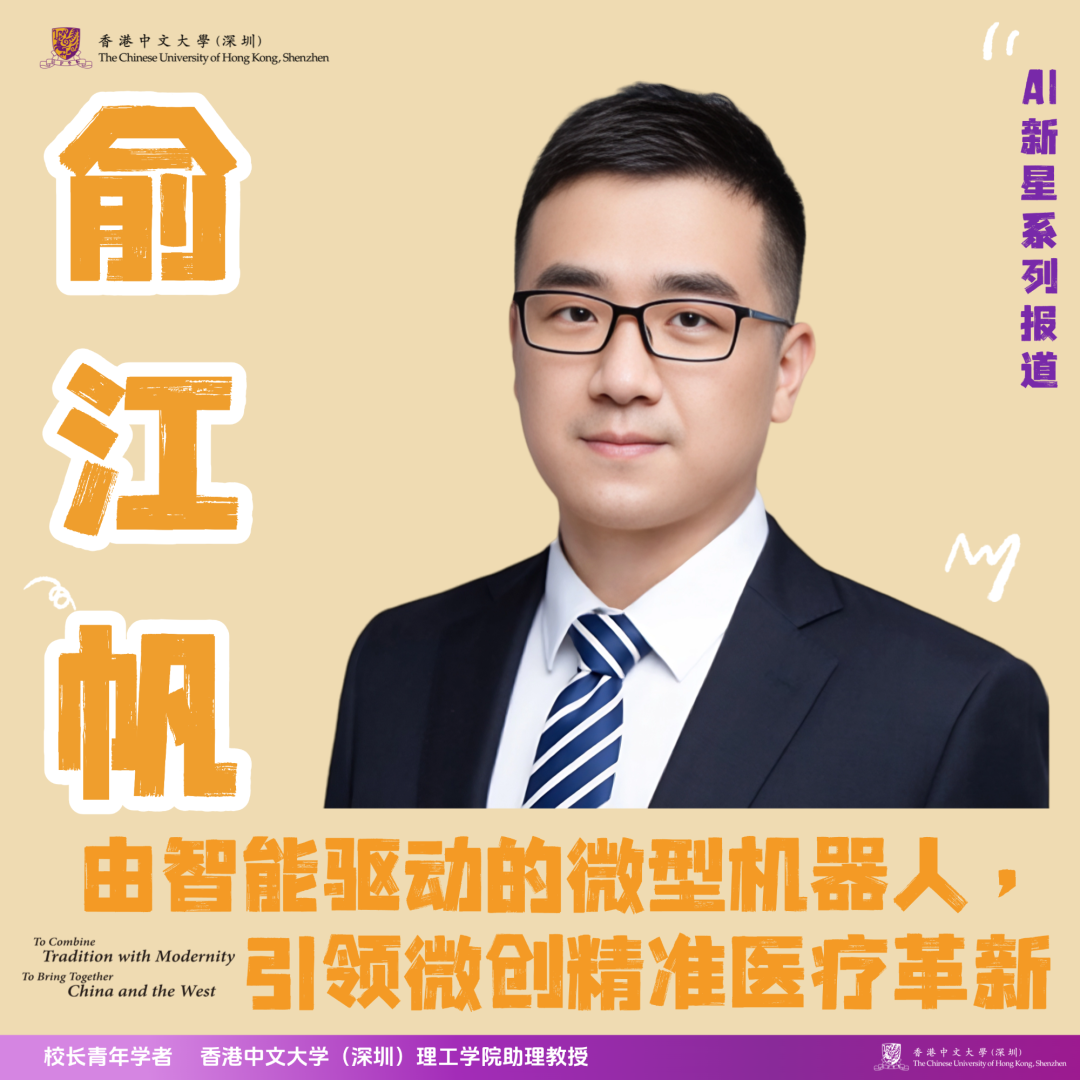
Professor Yu Jiangfan’s team at The Chinese University of Hong Kong (Shenzhen) is leading innovations in precision medicine by endowing micro-robots with high intelligence. By integrating adaptive control algorithms and artificial intelligence methods, the team has successfully developed a micro-robotic swarm system applicable within the human body, allowing micro-robot doctors to work collaboratively in complex human environments, move flexibly, reorganize, make optimal decisions autonomously, and perform precise minimally invasive surgeries, making non-invasive precision diagnosis and treatment possible, and is expected to help doctors formulate more precise and effective treatment plans for major diseases in the future.
Professor Yu Jiangfan’s team at CUHK (Shenzhen) is advancing the application of AI-driven micro-robot technology in precision medicine, having achieved multiple breakthroughs in various scenarios within the micro-robotics field, successfully addressing several key technical challenges.
Utilizing artificial intelligence technologies and intelligent methods, Professor Yu Jiangfan’s research focuses on how to enable micro-robots to possess high autonomy and intelligent decision-making capabilities, achieving dynamic planning of optimal living pathways and intelligent-driven real-time imaging navigation to complete precise minimally invasive surgeries and intelligent diagnostics, and applying research results to the structural design, drive control, and therapeutic effect verification of micro-robots. The team is committed to developing a full-path research approach for micro-robots, including functional biomaterial design, optimized drive methods, adaptive intelligent control strategies, and the development of disruptive new medical platforms, providing efficient, intelligent, and stable technical support for precision medicine. For example, a new hydrogel robotic platform applied in the treatment of pulmonary diseases can achieve three-dimensional targeted delivery of drugs to the distal bronchi; using magnetic field-controlled swarm motion to implement active exploration strategies can provide new solutions for stroke treatment through reconstructed vascular imaging; and a multi-layer structured magnetic-controlled robot with multi-target treatment capabilities opens up new pathways for minimally invasive treatment of multiple gastric ulcers.
Dynamic Obstacle Avoidance Technology:
Empowering Autonomous Decision-Making Capabilities
To achieve precise and efficient minimally invasive medical procedures, the autonomous obstacle avoidance capability of micro-robot swarms is crucial. Imagine a group of “mission-driven” micro-robots that possess automatic evasion capabilities like a swarm in a complex dynamic environment of the human body, providing targeted treatment for major diseases and treatment for cerebrovascular patients in the visible future.
Inspired by radar concepts, Professor Yu Jiangfan’s team proposed a dynamic obstacle avoidance control strategy based on hierarchical radar, capable of determining the optimal movement direction of the micro-robot swarm at any moment while ensuring both obstacle avoidance stability and delivery efficiency. Based on this technology, the swarm can navigate through multiple dynamic obstacles without collision and autonomously avoid obstacles in a maze with various dynamic obstacles, ultimately reaching the target location. This achievement was published in IEEE Transactions on Robotics 2023, Issue 4.
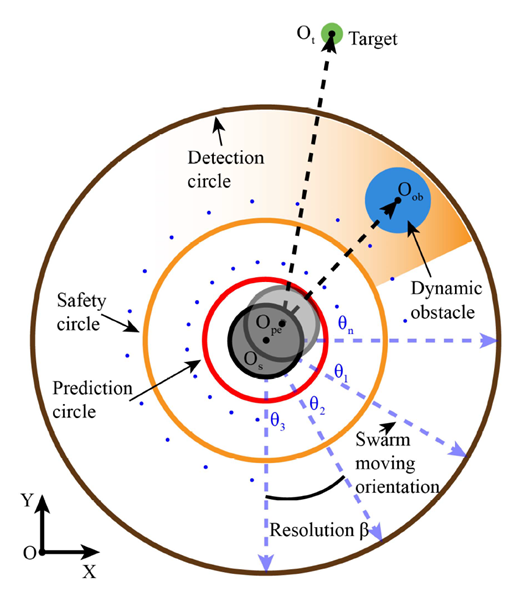
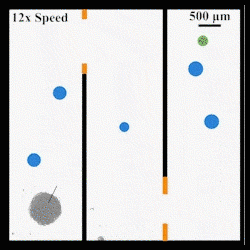
Dynamic obstacle avoidance algorithm and experimental results of micro-robot swarms
Hydrogel Micro-Robotic Swarm:
Facilitating Targeted Delivery in the Bronchi
Imagine a group of “delivery agents” that can disassemble and recombine like Transformers within a patient’s bronchi, providing doctors with medical imaging data and three-dimensional positioning and navigation, while quickly and accurately delivering drugs to specified lesions, achieving precise strikes in the treatment of respiratory diseases. This is the hydrogel micro-robotic swarm developed by Professor Yu Jiangfan’s team.
The precise treatment of respiratory system diseases relies on efficient targeted delivery technology, while traditional delivery methods are limited by insufficient precision and the constraints of bronchoscopy operations, leading to limited treatment effects. To break through this bottleneck, the hydrogel micro-robotic swarm developed by Professor Yu Jiangfan’s team can efficiently move and adaptively reconstruct in the complex bronchi filled with air, and combine medical imaging data-guided path planning methods to achieve three-dimensional precise positioning and navigation in vivo, enabling precise delivery and release of drugs. By integrating AI algorithms, the autonomous decision-making capabilities of the robotic swarm in complex physiological environments will be further enhanced, accelerating the clinical translation of intelligent precision treatment for the lungs. This achievement was published in Science Advances 2025, Issue 11.
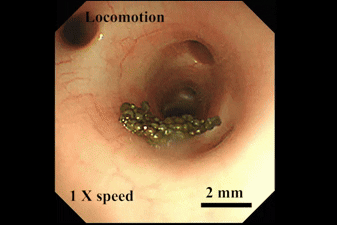
Cluster delivery in the living pig bronchi
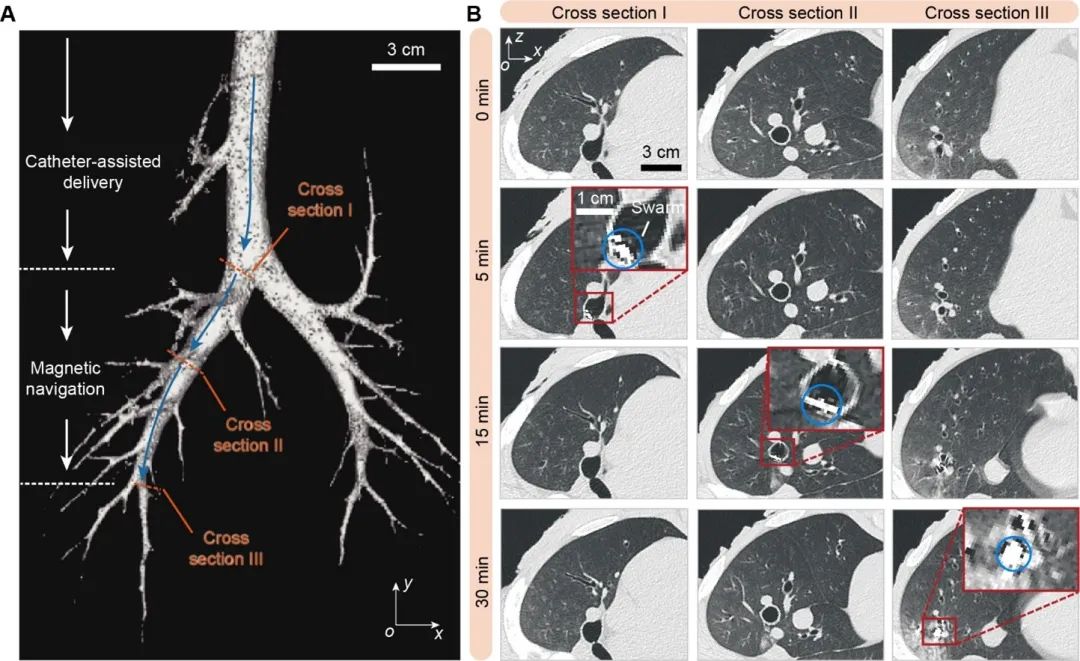
Cluster delivery based on CT imaging in the depths of the lungs
Active Exploration Strategy:
Facilitating Vascular Imaging in Key Disease Areas
When blood vessels experience “traffic congestion”, a group of micro-robots will be tasked to act as “reporters” and “traffic guides”, providing doctors with real-time three-dimensional maps of blood vessels, breaking through the limitations of traditional vascular imaging technology. This is one application of the active exploration strategy utilizing magnetic field-controlled swarm motion in minimally invasive medicine.
Vascular imaging is a key technology in interventional treatment, but traditional imaging methods rely on the passive diffusion of contrast agents, which can severely affect imaging quality in areas of slow or reverse blood flow. To address this challenge, Professor Yu Jiangfan’s team proposed an active exploration and lumen structure reconstruction strategy based on micro-robot swarms, utilizing magnetic field-controlled swarm motion to define global exploration priority strategies and establish multi-dimensional logic for local exploration direction determination, achieving precise imaging and structural reconstruction of complex three-dimensional vascular networks. This strategy can assist doctors in accurately locating thrombus, stenosis sites, and leakage points, playing a significant role in diseases such as ischemic stroke, portal vein embolism, and lymphatic fistula. This achievement was published in Nature Machine Intelligence 2025.
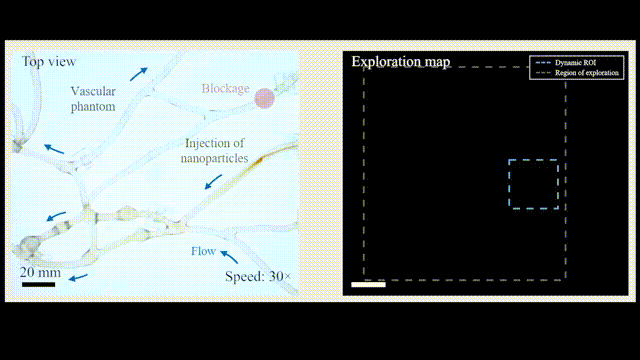
Validation of active exploration in the lymphatic network model
Magnetic-Controlled Soft Robot Intelligent Design:
Advancing Multi-Target Adhesion in the Stomach
Imagine a “band-aid” that can stick wherever needed in the stomach, significantly reducing the surgical time for doctors. Through external magnetic field remote control, a medical “band-aid” that can firmly adhere to the surface of ulcers and apply multi-point adhesion layer by layer is the magnetic-controlled soft robot developed by Professor Yu Jiangfan’s team.
To treat multiple gastric ulcers, Professor Yu Jiangfan’s team developed a multi-layer structured soft robot with weakly coupled magnetic interactions. By combining material interface design, inter-layer magnetic interaction control, and intelligent magnetic control strategies, it can achieve tissue adhesion on demand and layer-by-layer peeling, ultimately adhering to multiple lesions in the stomach as needed. The functionality of this robot has been successfully validated in live pig experiments, providing a new solution for minimally invasive precision treatment of multiple gastric ulcers. This achievement was published in Nature Communications 2024, Issue 1.
 In vitro validation of multi-target adhesion strategy
In vitro validation of multi-target adhesion strategy
The core strength of Professor Yu Jiangfan’s research team comes from the doctoral students cultivated by CUHK (Shenzhen), whose growth also witnesses the university’s successful exploration in talent cultivation. Doctoral students Chen Hui, Wang Yibin, Liu Yuezhen, and Fang Kaiwen are typical representatives, continuously innovating and delving into fields such as automatic control of micro-nano robot swarms, targeted delivery of functionalized micro-robot swarms, and integrated design of drive-control imaging devices.
In the context of accelerated innovation driven by artificial intelligence, CUHK (Shenzhen) continues to deepen its research in the field of AI, leveraging the research achievements of its scientific teams and high-quality faculty to contribute more wisdom to scientific research, educational model transformation, and technological industrialization.
CUHK-Shenzhen
Profile of Young Professor

Yu Jiangfan
Young Scholar of the President
Assistant Professor at The Chinese University of Hong Kong (Shenzhen)
Educational Background:
Bachelor: Harbin Institute of Technology
PhD: The Chinese University of Hong Kong
Research Areas:
Micro-robots, next-generation medical robots
Yu Jiangfan is an assistant professor at The Chinese University of Hong Kong (Shenzhen), a young scholar of the president, and the director of the Micro-Robotics Center at the Shenzhen Institute of Artificial Intelligence and Robotics (AIRS). He is a national high-level young talent, leading projects such as the National Key R&D Program for Young Scientists, the National Natural Science Foundation, Guangdong Provincial General Projects, and Shenzhen Key Projects. He is the academic leader of the AIRS-CM Medical Robot Future Industry Joint Laboratory and serves as an executive member of the CCF Intelligent Robotics Committee and a senior member of IEEE. His research mainly focuses on medical micro-robots, and he has published over 70 articles in top journals and conferences, as well as 2 monographs, including articles in Nature Machine Intelligence, Science Advances, Nature Communications, IJRR, TRO, and Advanced Materials. He has received several influential awards, including the IEEE RAS Early Academic Career Award, the IROS Best Student Conference Paper Award, the Frontier Science Award at the International Basic Science Conference, the Wu Wenjun Artificial Intelligence Science and Technology Award (Second Prize in Natural Science), the Baidu Global Chinese AI Young Scholar Award, and the IEEE 3M-NANO Rising Star Award. He serves as a reviewer for several top journals and conferences, including Science Robotics, Science Advances, Nature Communications, and PNAS.

Produced by the Communications and Public Relations Office (CPRO)
Images and content provided by Professor Yu Jiangfan’s team
◮▽▲▽◮
Browse the AI New Stars series reports
【AI New Stars Series Report One】Lin Tianlin: From Sci-Fi Inspiration to the Frontiers of Research【AI New Stars Series Report Two】Zhu Xi: One AI Mentor is Greater than 100 PhDs and 1000 Professors【AI New Stars Series Report Three】Wang Benyou: Making General Medical AI Accessible to the World【AI New Stars Series Report Four】Fang Yixiang: Making Large Models More Accurate and Reliable【AI New Stars Series Report Five】Wu Zhizheng: Creating Emotionally Intelligent Voice Large Models【AI New Stars Series Report Six】Wu Baoyuan: AI Safety is Not Only a Technical Challenge but Also a Social Responsibility【AI New Stars Series Report Seven】Sun Qilin: Equipping Machines with “Super Eyes” of Chinese Manufacturing
◮▽▲▽◮
Follow us for more campus news


Official WeChat Account
cuhksz2014

▲ Sina Weibo

▲ Bilibili
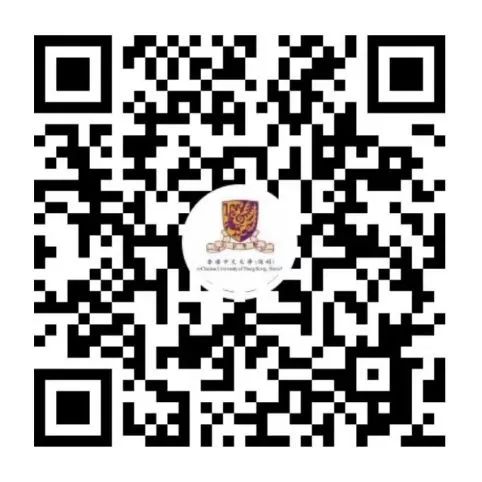
▲ Video Account

▲ Douyin
The above content is reproduced from the “Chinese University of Hong Kong Shenzhen” public account